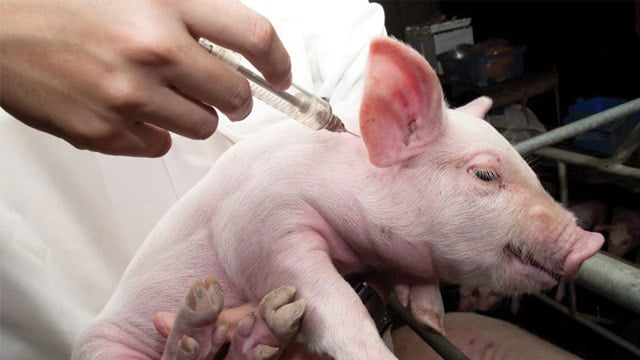May 16, 2025 | 10:42 GMT +7
May 16, 2025 | 10:42 GMT +7
Hotline: 0913.378.918
May 16, 2025 | 10:42 GMT +7
Hotline: 0913.378.918

Veterinary staff vaccinating pigs.
The causative agent of African swine fever (ASF) is an enveloped, double-stranded DNA virus from the Asfarviridae family, genus Asfivirus. Its genome is approximately 170–193 kbp long, containing around 151–167 open reading frames that encode more than 50 distinct proteins.
Among these, the p72 protein is highly antigenic. It is encoded by the B646L gene and has a molecular weight of approximately 73.5 kDa. This protein plays a critical role in forming the virus’s capsid shell during infection.
ASFV is the only known virus with a double-stranded DNA genome that is transmitted by arthropods. At least 24 distinct strains of the virus have been identified in Africa. However, only two strains, Types I and II, have been detected outside of the continent. In Asia, including Vietnam, only Type II is known to be circulating.
Professor Le Van Phan from the Vietnam National University of Agriculture explained that the IGR region, an epidemiological marker used to trace the origin, relationships, and outbreaks of virus strains, plays a vital role in research. He noted that nine genes are associated with ASFV virulence, such as MGF, CD2v, and I177L. Each gene varies in length and characteristics, influencing the strain's virulence level depending on their presence and combination.
In recent years, the discovery rate of highly pathogenic recombinant ASF virus strains has risen. Following Vietnam’s announcement of the successful development of a commercial vaccine for ASF in 2023, a research team from the Vietnam University of Agriculture collaborated with AVAC Vietnam (a leading vaccine production enterprise) to conduct trials. They experimented with 18 eight-week-old hybrid pigs in Bac Giang Province, identifying new ASFV variants in the process.
All pigs were confirmed negative for ASF, porcine circovirus-2, foot-and-mouth disease, classical swine fever, and porcine reproductive and respiratory syndrome virus by PCR, as well as negative for anti-ASFV antibodies by enzyme-linked immunosorbent assay. The research team then divided the pigs into 3 groups, and then infected them by different routes such as nasal, oral, intramuscular injection, etc.

Associate Professor, Dr. Le Van Phan, Vietnam Academy of Agriculture. Photo: Tung Dinh.
Based on clinical diagnosis, virus isolation and serological testing, the group concluded that there are currently four highly virulent Type II strains of ASFV circulating in Vietnam. These strains can cause different symptoms in pigs (fever, hemorrhage, visceral swelling, etc.) but all cause death in pigs. In contrast, the low-virulence Type I strain, which often causes chronic diseases in pigs, has not been found.
However, Dr. Le Van Phan emphasized: “The existence of recombinant Type I and II strains with high virulence causing acute disease has been found in experiments.” In addition, the expert from the Vietnam University of Agriculture also admitted that some strains with deletion of the MGF505-2R gene and MGF 505, MGF 110, MGF 300 causing low virulence also exist.
Due to their highly virulent nature and vaccine resistance, the emerging strains (recombinant types I and II) could soon replace the Type II ASFV circulating in the region, derailing efforts to control ASF. The development of a new vaccine is urgently needed.
Dr. Truong Quang Lam, from the Vietnam University of Agriculture, added that to date, there is no globally approved African swine fever vaccine for ASF. However, live attenuated ASFV strains are considered the most promising vaccine candidates available.
“We have made initial assessments of the virulence and safety of the live attenuated vaccine strain on experimental pigs, and at the same time tested the immune response and protective efficacy of the live attenuated vaccine strain,” Mr. Lam shared, believing that the live attenuated vaccine is the solution to future ASFV variants.
Several live attenuated ASFV strains, including HLJ/18-7GD, ASFV-G-ΔI177L, and ASFV-G-ΔMGF, have been shown to provide complete protection against virulent ASFV challenge. Of these, ASFV-G-ΔI177L and ASFV-G-ΔMGF strains have been licensed to NAVETCO and AVAC, respectively, for commercial vaccine production in Vietnam.
In recent years, scientists have demonstrated that the hemagglutination inhibition method of serotyping is neither practical nor effective for serotyping of ASFV circulating in the field because the method requires live virus and ASFV-resistant swine serum.
This is unlikely to be possible due to the difficulty in collecting serum capable of immune response to ASFV from live pigs because this antibody appears late, the titer is low and the virulence of highly pathogenic ASFV Type II in Vietnam is often extreme, so pigs are likely to die within 5 to 10 days after infection.
To solve this problem and also to know the serotype of ASFV to serve the work of preparing a vaccine to prevent the disease, scientists have identified and demonstrated the determination of serogroup type based on the method of analyzing the nucleotide sequence of the protein-coding region of the CD2v gene.
“The initial vaccine is unlikely to have the desired safety rate or achieve the same rate in the laboratory. In addition, we also need to consider other factors such as the FCR index (feed consumption/kg body weight), or lung damage in pigs after vaccination,” Associate Professor, Dr. Le Van Phan emphasized.
Because African swine fever vaccines are still conditional vaccines, farmers must pay attention to factors such as age, commercial pigs or sows, and whether they have underlying diseases or not. In addition, when the farm is at risk of disease, avoid vaccination because the effectiveness will not be as expected.
African swine fever is highly contagious and can cause significant damage to the livestock industry. The virus was first identified in 1907 and first described in 1921 in Kenya. It then spread to Europe, South America and the Caribbean in the middle of the last century. The disease was first reported in Vietnam in February 2019.
![Multi-channel, multi-directional Vietnamese agricultural markets: [7] Deep processing makes global reach easy](https://t.ex-cdn.com/nongnghiepmoitruong.vn/608w/files/huytd/2025/05/16/2946-che-bien-sau-chia-khoa-vang-nang-tam-nong-san-viet-tren-ban-do-the-gioi-080603_110-093858.jpg)
(VAN) The application of deep processing technology is helping Vietnamese agricultural products enhance their value, create competitive advantages, and open doors to conquer global consumers.
![Multi-channel, multi-directional Vietnamese agricultural markets: [6] Agri products go online](https://t.ex-cdn.com/nongnghiepmoitruong.vn/608w/files/content/2024/12/10/1-113313_954.jpg)
(VAN) Bringing agri products onto e-commerce platforms is an effective way to build a brand that many businesses, cooperatives, and agricultural production households are doing.

(VAN) Veterinary training should focus on quality, not just quantity. Veterinarians also need more options to pursue specialized training.

(VAN) The veterinary industry needs to be viewed objectively and further invested in to properly demonstrate its role and importance in the new context.

(VAN) The number of veterinarians graduating each year is not enough to meet actual needs, hence a difficult problem for the growing livestock industry.

(VAN) The strategic partnership between Cambodia, the Philippines, Vietnam, and CGIAR ensures that innovative solutions effectively address national priorities for food system development.

(VAN) This was affirmed by the UK Minister of State at the Department for Environment, Food and Rural Affairs during a working session with Deputy Minister Tran Thanh Nam on May 13.